习语等解释性翻译
- 格式:doc
- 大小:82.00 KB
- 文档页数:10
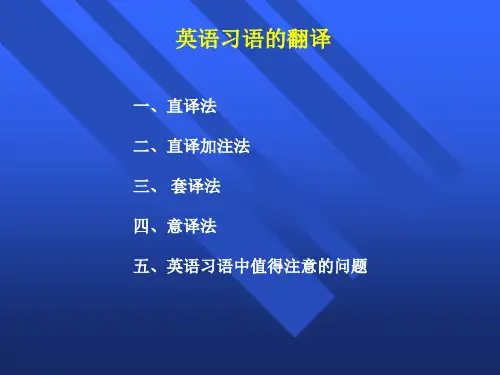
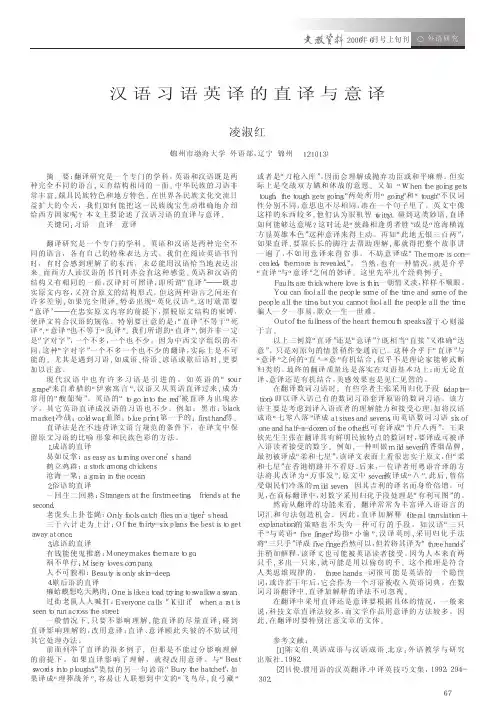

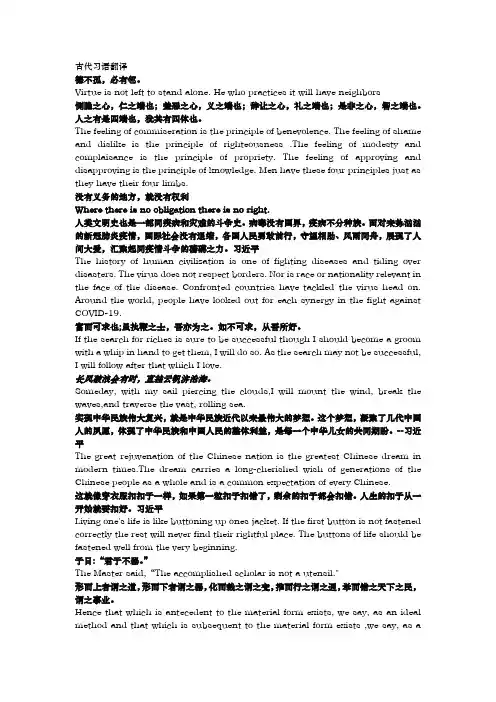
古代习语翻译德不孤,必有邻。
Virtue is not left to stand alone. He who practices it will have neighbors恻隐之心,仁之端也;羞恶之心,义之端也;辞让之心,礼之端也;是非之心,智之端也。
人之有是四端也,犹其有四体也。
The feeling of commiseration is the principle of benevolence. The feeling of shame and dislike is the principle of righteousness .The feeling of modesty and complaisance is the principle of propriety. The feeling of approving and disapproving is the principle of knowledge. Men have these four principles just as they have their four limbs.没有义务的地方,就没有权利Where there is no obligation there is no right.人类文明史也是一部同疾病和灾难的斗争史。
病毒没有国界,疫病不分种族。
面对来势汹汹的新冠肺炎疫情,国际社会没有退缩,各国人民勇敢前行,守望相助、风雨同舟,展现了人间大爱,汇聚起同疫情斗争的磅礴之力。
习近平The history of human civilization is one of fighting diseases and tiding over disasters. The virus does not respect borders. Nor is race or nationality relevant in the face of the disease. Confronted countries have tackled the virus head on. Around the world, people have looked out for each synergy in the fight against COVID-19.富而可求也;虽执鞭之士,吾亦为之。
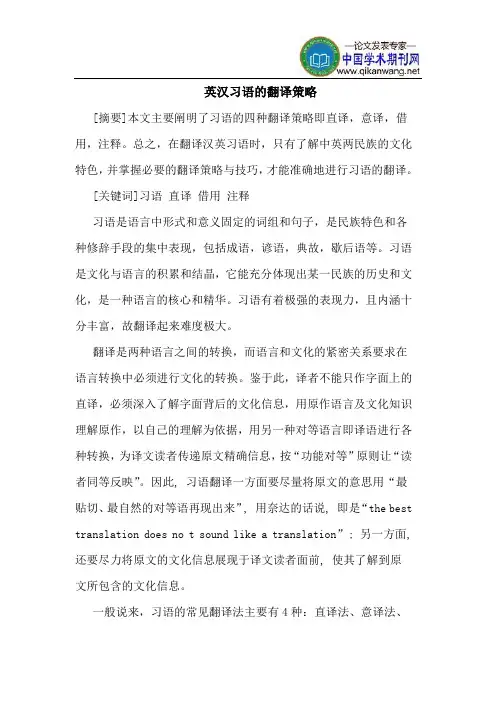
英汉习语的翻译策略[摘要]本文主要阐明了习语的四种翻译策略即直译,意译,借用,注释。
总之,在翻译汉英习语时,只有了解中英两民族的文化特色,并掌握必要的翻译策略与技巧,才能准确地进行习语的翻译。
[关键词]习语直译借用注释习语是语言中形式和意义固定的词组和句子,是民族特色和各种修辞手段的集中表现,包括成语,谚语,典故,歇后语等。
习语是文化与语言的积累和结晶,它能充分体现出某一民族的历史和文化,是一种语言的核心和精华。
习语有着极强的表现力,且内涵十分丰富,故翻译起来难度极大。
翻译是两种语言之间的转换,而语言和文化的紧密关系要求在语言转换中必须进行文化的转换。
鉴于此,译者不能只作字面上的直译,必须深入了解字面背后的文化信息,用原作语言及文化知识理解原作,以自己的理解为依据,用另一种对等语言即译语进行各种转换,为译文读者传递原文精确信息,按“功能对等”原则让“读者同等反映”。
因此, 习语翻译一方面要尽量将原文的意思用“最贴切、最自然的对等语再现出来”, 用奈达的话说, 即是“the best translation does no t sound like a translation”; 另一方面, 还要尽力将原文的文化信息展现于译文读者面前, 使其了解到原文所包含的文化信息。
一般说来,习语的常见翻译法主要有4种:直译法、意译法、借用法、注释法。
下面我们分别谈谈每种译法的具体思路。
一、直译法直译,指在不违背译文语言规范以及不引起错误联想的条件下,在译文中保留原习语的民族色彩、语言风格和比喻形象的方法。
例如:鱼目混珠—pass fish eye for pearls摊出最后一张牌—play one’s last card像狐狸一样狡猾—as cunning as a fox类似这样的习语译文,读者只要用心体会一下,就会明白其隐含意义,不但保留了原文的形象,而且增加了阅读的趣味二、意译法意译法指在充分理解原习语的基础上,舍弃其中陌生难懂的比喻形象而采用的一种方法。
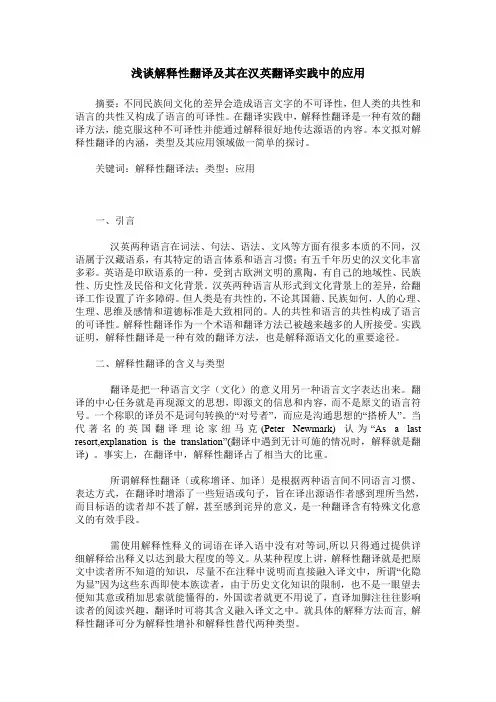
浅谈解释性翻译及其在汉英翻译实践中的应用摘要:不同民族间文化的差异会造成语言文字的不可译性,但人类的共性和语言的共性又构成了语言的可译性。
在翻译实践中,解释性翻译是一种有效的翻译方法,能克服这种不可译性并能通过解释很好地传达源语的内容。
本文拟对解释性翻译的内涵,类型及其应用领域做一简单的探讨。
关键词:解释性翻译法;类型;应用一、引言汉英两种语言在词法、句法、语法、文风等方面有很多本质的不同,汉语属于汉藏语系,有其特定的语言体系和语言习惯;有五千年历史的汉文化丰富多彩。
英语是印欧语系的一种,受到古欧洲文明的熏陶,有自己的地域性、民族性、历史性及民俗和文化背景。
汉英两种语言从形式到文化背景上的差异,给翻译工作设置了许多障碍。
但人类是有共性的,不论其国籍、民族如何,人的心理、生理、思维及感情和道德标准是大致相同的。
人的共性和语言的共性构成了语言的可译性。
解释性翻译作为一个术语和翻译方法已被越来越多的人所接受。
实践证明,解释性翻译是一种有效的翻译方法,也是解释源语文化的重要途径。
二、解释性翻译的含义与类型翻译是把一种语言文字(文化)的意义用另一种语言文字表达出来。
翻译的中心任务就是再现源文的思想,即源文的信息和内容,而不是原文的语言符号。
一个称职的译员不是词句转换的“对号者”,而应是沟通思想的“搭桥人”。
当代著名的英国翻译理论家纽马克(Peter Newmark) 认为“As a last resort,explanation is the translation”(翻译中遇到无计可施的情况时,解释就是翻译) 。
事实上,在翻译中,解释性翻译占了相当大的比重。
所谓解释性翻译〔或称增译、加译〕是根据两种语言间不同语言习惯、表达方式,在翻译时增添了一些短语或句子,旨在译出源语作者感到理所当然,而目标语的读者却不甚了解,甚至感到诧异的意义,是一种翻译含有特殊文化意义的有效手段。
需使用解释性释义的词语在译入语中没有对等词,所以只得通过提供详细解释给出释义以达到最大程度的等义。
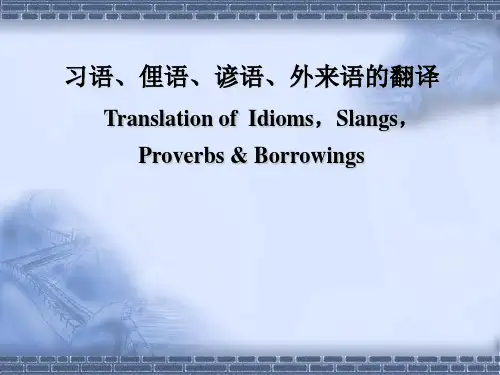

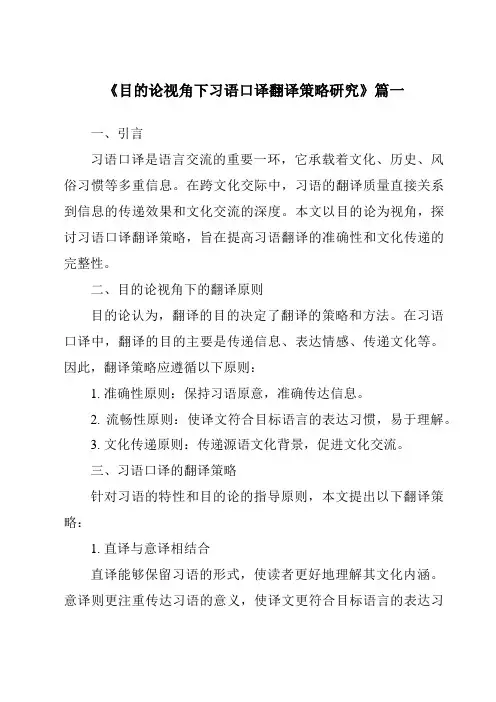
《目的论视角下习语口译翻译策略研究》篇一一、引言习语口译是语言交流的重要一环,它承载着文化、历史、风俗习惯等多重信息。
在跨文化交际中,习语的翻译质量直接关系到信息的传递效果和文化交流的深度。
本文以目的论为视角,探讨习语口译翻译策略,旨在提高习语翻译的准确性和文化传递的完整性。
二、目的论视角下的翻译原则目的论认为,翻译的目的决定了翻译的策略和方法。
在习语口译中,翻译的目的主要是传递信息、表达情感、传递文化等。
因此,翻译策略应遵循以下原则:1. 准确性原则:保持习语原意,准确传达信息。
2. 流畅性原则:使译文符合目标语言的表达习惯,易于理解。
3. 文化传递原则:传递源语文化背景,促进文化交流。
三、习语口译的翻译策略针对习语的特性和目的论的指导原则,本文提出以下翻译策略:1. 直译与意译相结合直译能够保留习语的形式,使读者更好地理解其文化内涵。
意译则更注重传达习语的意义,使译文更符合目标语言的表达习惯。
在口译中,应根据具体情况灵活运用直译和意译,以达到最佳效果。
2. 文化背景的补充习语往往蕴含着丰富的文化背景信息。
在口译过程中,应对这些文化背景进行适当的补充,帮助听众理解习语的深层含义。
例如,对于含有典故的习语,可简要介绍典故背景,使译文更加生动。
3. 语境推测与解释当习语的直接翻译难以理解时,可通过推测其语境和含义,给出解释性翻译。
这有助于听众理解习语的用法和含义,促进跨文化交流。
四、实例分析以“画蛇添足”这一习语为例,在口译过程中,可采用直译与意译相结合的策略。
直译为“Drawing a snake and adding feet”,这种表达虽然保留了原习语的形式,但在理解上可能存在一定的难度。
因此,可采取意译的策略,译为“Trying to improve a situ ation that is already good”,这种表达更符合英语习惯,易于理解。
同时,为帮助听众理解这一习语的出处和文化背景,可适当补充解释:“This idiom comes from a story about someone trying to improve a painting of a snake by adding feet, but it actually made the painting worse. ”五、结论本文从目的论的视角出发,探讨了习语口译的翻译策略。
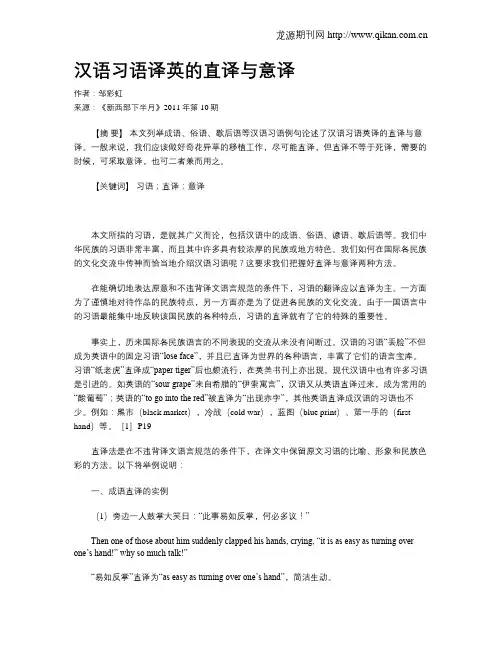
汉语习语译英的直译与意译作者:邹彩虹来源:《新西部下半月》2011年第10期【摘要】本文列举成语、俗语、歇后语等汉语习语例句论述了汉语习语英译的直译与意译。
一般来说,我们应该做好奇花异草的移植工作,尽可能直译,但直译不等于死译,需要的时候,可采取意译,也可二者兼而用之。
【关键词】习语;直译;意译本文所指的习语,是就其广义而论,包括汉语中的成语、俗语、谚语、歇后语等。
我们中华民族的习语非常丰富,而且其中许多具有较浓厚的民族或地方特色。
我们如何在国际各民族的文化交流中传神而恰当地介绍汉语习语呢?这要求我们把握好直译与意译两种方法。
在能确切地表达原意和不违背译文语言规范的条件下,习语的翻译应以直译为主。
一方面为了谨慎地对待作品的民族特点,另一方面亦是为了促进各民族的文化交流。
由于一国语言中的习语最能集中地反映该国民族的各种特点,习语的直译就有了它的特殊的重要性。
事实上,历来国际各民族语言的不同表现的交流从来没有间断过。
汉语的习语“丢脸”不但成为英语中的固定习语“lose face”,并且已直译为世界的各种语言,丰富了它们的语言宝库。
习语“纸老虎”直译成“paper tiger”后也颇流行,在英美书刊上亦出现。
现代汉语中也有许多习语是引进的。
如英语的“sour grape”来自希腊的“伊索寓言”,汉语又从英语直译过来,成为常用的“酸葡萄”;英语的“to go into the red”被直译为“出现赤字”,其他英语直译成汉语的习语也不少。
例如:黑市(black market),冷战(cold war),蓝图(blue print)、第一手的(first hand)等。
[1]P19直译法是在不违背译文语言规范的条件下,在译文中保留原文习语的比喻、形象和民族色彩的方法。
以下将举例说明:一、成语直译的实例(1)旁边一人鼓掌大笑日:“此事易如反掌,何必多议!”Then one of those about him suddenly clapped his hands, crying, “it is as easy as turning over one’s hand!” why so much talk!”“易如反掌”直译为“as easy as turning over one’s hand”,简洁生动。
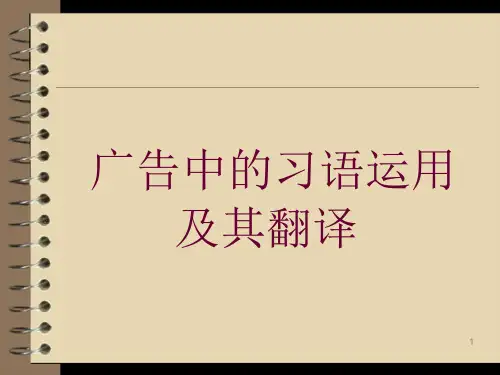
A· A chain is no stronger than its weakest link. 一着不慎,满盘皆输.· All is not gold that glitters. 闪光的未必都是金子。
· A child is better unborn than untaught. 养不教,父之过。
· Art is long, life is short. 生命短暂,艺术长存。
· A friend is best found in adversity. 患难见真情。
· Although the sun shine, leave not your cloak at home. 未雨绸缪。
· A light heart live long. 心情开朗寿命长。
不恼不愁,活到白头。
· An apple a day keeps the doctor away. 日吃苹果一只,身体健康不求医。
· All covet, all lose. 样样垂涎,样样失落。
贪多嚼不烂。
· A good winter brings a good summer. 瑞雪兆丰年。
· All rivers run into the sea. 殊途同归。
· A small leak will sink a great ship. 千里之堤溃于蚁穴。
· All time is no time when it is past. 机不可失,时不再来。
· A baker's wife may bite of a bun, a brewer's wife may bite of a tun.近水楼台先得月。
· A short cut is often a wrong cut.欲速则不达。
中英习语解释性翻译或形象具体互译一、以《浮生六记》为例1.一灯如豆…The light of a rapeseed oil lamp was then burning as small as a pea.2. 但李诗宛如姑射仙子,有一种落花流水之趣,令人可爱。
…but Li Po’s poems have the wayward charm of a nymph. His lines come naturally like dropping petals and flowing waters, and are so much lovelier for their spontaneity.3. 兼之玉碎香埋,不堪回首矣。
… and the woman I loved is dead, like broken jade and buried incense. How sad indeed to look back upon these things.4. 芸初缄默,喜听余议论。
余调其言,如蟋蟀之用纤草,渐能发议。
Yun was at first very quiet and loved to hear me talk, but I gradually taught her the art of conversation as one leads a cricket with a blade of grass. She then learned the art of conversation.5.……有女名憨园。
亭亭玉立,真一泓秋水照人寒。
She had a girl by the name of Hanyuan, who was a very sweet young maiden, still in her teens. Her eyes looked“like an autumn lake that cooled one by its cold splendor”.【2】二、Double-way: literal translation; borrowing; paraphrase1.过街老鼠(直译)like a rat crossing the street(意译) the object of universal condemnation; a bad man hated by everybody2.门庭若市(直译) the courtyard is like a market.(意译)a much visited house; a busy town; bustling; crowded3.望梅止渴(直译)to gaze at plums to quench one’s thirst(意译)to console oneself with false hopes; to feed on fancies (illusion); imagined satisfaction; a Barmecide (《一千零一夜》中一个口惠而实不至的人物)feast.4.危如累卵(直译)as dangerous as a pile of eggs(意译)hazardous in the extreme; great insecurity; in a precarious condition; at stake, at risk; at hazard; in peril; in danger; perilous; risky; critical...5.山雨欲来风满楼(直译)The wind sweeping through the tower heralds a rising storm in the mountains.(意译)A turbulent situation foretells a big event; Coming events cast their shadows before.6.树倒猢狲散(直译)When the tree falls, the monkeys scatter.(意译)Members run away when the family (constitution) falls; when an influential person fallsfrom power, his hangers-on disperse; Rats leave a sinking ship.7. 三个臭皮匠顶得上诸葛亮(直译)Three cobbers with their wits combined equal ZhuGeliang the master mind.(意译) eamwork; Brainstorming; Many hands make light work.; Two heads are better than one. (拙译) wits combined are wits of great mind; Wits combined are wits that satisfy;8. 螳螂捕蝉,黄雀在后(直译)The mantis stalks the cicada but behind them lurks the oriole (金莺;黄莺儿).(意译) Be careful about the hidden/implicit\potential risks; hazards;9. 比上不足,比下有余(直译)worse off than some, better off than many; to fall short of the best, but be better than the worst; better off than the worst and worse off than the best;(意译)fairly well-off; fairly contented life;10. 不以物喜,不以己悲(直译)not pleased by external gains, not saddened by personal losses;(意译)take one’s personal gains lightly; to be philosophical about; be open-minded;11. 金无足赤,人无完人(直译) Gold can't be pure and man can't be perfect;(意译)Human beings are human beings三、形象—具体1. 哭得泪人似的A.The child was in floods of tears.B.Be drenched in tearsC.He became a wretch of tearsD.While Mother was feeling so wrought, the slightest cross word or ill-judgedremark could reduce her to tears.当母亲感到过分劳累紧张时,哪怕是听到一点点令人生气的话或不妥之词,都会使她伤心得落下泪来。
2. 唉声叹气a. To moan and groanb. Heave deep sighsc. Sigh in despair3. 矮子里拔将军A. Pick or single out a general from among the dwarfsb. Choose the best person availablec. In the country of the blind, the one-eyed man is king.d. To settle for an undesirable candidate or alternative.4. 碍手碍脚a. be obstructed by one's hands and feetb. To be or stand in the wayc. To be a hindranced. To be cumbersome5. 爱不释手a. like [love] sth. so much that one cannot bear to part with it;b. be fond of and unwilling to part with;c. be so delighted with it that one could hardly bear to put it down;d. be too fond of sth. to let go of ite. To fondle sth admiringlyf. I can always lose myself in a good book. 来自《简明英汉词典》g. The novel is so instructive that I can hardly tear myself away from it. 这部小说很有意义,简直使我爱不释手。
来自《现代汉英综合大词典》h. He indulges in a new hat. 他对一项新帽子爱不释手。
来自辞典例句i. The book is a page-turner. 这本书引人入胜,叫人爱不释手。
6. 爱屋及乌a. Love for a person extends even to the crows on his roof.b. Love me, love my dog.7. 画蛇添足a. if you are telling a lie, keep it simple—never overegg the pudding.b. draw a snake and add feet to itc. ruin the effect by adding sth superfluousd. leave enough alone 不要画蛇添足7.花前月下a.before the flowers and under the moonb.ideal setting for a couple in lovec.romantic circumstancesd.romance8.花容月貌a.one’s face is like flowers and one’s features like the moonb.fair as a flower and beautiful as the moon9.囫囵吞枣a.to swallow dates wholep up (照单全收;欣然接受)information without digesting itc.read without understanding10.呼风唤雨a.summon wind and rainb.control the forces of naturec.stir up trouble11.洪水猛兽a.fierce floods and savage beastsb.great scourges (祸害;灾难)c.formidable disasters三、释义1. 辞旧迎新bid farewell to the old and usher in the new; ring out the old year and ring in the new; wind up the old, unfold the new2. 过犹不及going too far is as bad as not going far enough; Beyond is as wrong as falling short; too much is as bad as too littleOverdoing is underdoing.More is less; less is more四、练习英译汉1.Unless you’ve got an ace up your sleeve, we are dished. 除非你有锦囊妙计,否则,我们是输定了。